|
|
|
Sort Order |
|
|
|
Items / Page
|
|
|
|
|
|
|
| Srl | Item |
| 1 |
ID:
162609
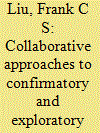

|
|
|
| 2 |
ID:
169087
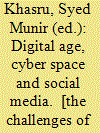

|
|
|
|
|
| Publication |
Dhaka, IPAG, 2020.
|
| Description |
vi, 260p.hbk
|
| Standard Number |
9789843467768
|
|
|
|
|
|
|
|
|
|
|
|
Copies: C:1/I:0,R:0,Q:0
Circulation
| Accession# | Call# | Current Location | Status | Policy | Location |
| 059762 | 303.4833/KHA 059762 | Main | On Shelf | General | |
|
|
|
|
| 3 |
ID:
139915
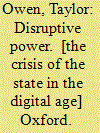

|
|
|
|
|
| Publication |
Oxford, Oxford University Press, 2015.
|
| Description |
x, 248p.Hbk
|
| Standard Number |
9780199363865
|
|
|
|
|
|
|
|
|
|
|
|
Copies: C:1/I:0,R:0,Q:0
Circulation
| Accession# | Call# | Current Location | Status | Policy | Location |
| 058270 | 327/OWE 058270 | Main | On Shelf | General | |
|
|
|
|
| 4 |
ID:
169783
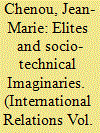

|
|
|
|
|
| Summary/Abstract |
In an ongoing debate between International Political Economy (IPE) and International Political Sociology (IPS), the question of technology provides an important entry point. For a number of decades, oil posed both security and economic issues. Today, we find ourselves at a point where information is about to replace oil as the most valuable resource. Whereas dominant (liberal) accounts of current technological transformations insist on the democratising potential of Information and Communication Technologies (ICTs), both IPE and IPS scholarships can contribute to critically analyse power relations in the digital age.
|
|
|
|
|
|
|
|
|
|
|
|
|
|
|
|
| 5 |
ID:
146570
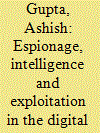

|
|
|
| 6 |
ID:
162204
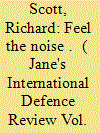

|
|
|
| 7 |
ID:
139669


|
|
|
|
|
| Summary/Abstract |
By looking at the case of the 2011 Wukan rebellion in Guangdong Province, the following article explores the role played by foreign media in influencing the protest’s ultimate outcome: an intervention from above by provincial authorities in favour of the villagers. Placing Wukan into a four-level model incorporating local, provincial, national, and international dimensions, this article considers howWukan might serve as a model for contention that may influence future acts of popular protest in China in the digital age. It suggests that while appealing directly to foreign media can help claimants increase their leverage over local officials and prompt interventions from above, such actions are likely to modify and accelerate, but not fundamentally transform, existing patterns of localized, community-specific acts of contention seen earlier in the Reform Era.
|
|
|
|
|
|
|
|
|
|
|
|
|
|
|
|
| 8 |
ID:
152646


|
|
|
|
|
| Summary/Abstract |
Digital communication leaves traces that can lead back to the person who initiated the communication or their location at the time. Jennifer Cole and Alexandra Stickings explore the challenges this brings for platforms that claim to offer anonymous crime reporting, and ask what can be done to assure members of the public that their identity can still be protected.
|
|
|
|
|
|
|
|
|
|
|
|
|
|
|
|
| 9 |
ID:
144588
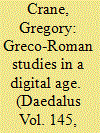

|
|
|
|
|
| Summary/Abstract |
What is the audience for the work that we professional researchers conduct on Greco-Roman culture? If the public outside academia does not have access to up-to-date data about the Greco-Roman world, whose problem is it? Frequently heard remarks, observed practices, and published survey results indicate most of us still assume that only specialists and revenue-generating students really matter. If we specialists do not believe that we have a primary responsibility to open up the field as is now possible in this digital age, then I am not sure why we should expect support from anyone other than specialists or the students who enroll in our classes. If we do believe that we have an obligation to open up the field, then that has fundamental implications for our daily activities, for our operational theory justifying the existence of our positions, and for the hermeneutics (following a term that is still popular in Germany) that we construct about who can know what.
|
|
|
|
|
|
|
|
|
|
|
|
|
|
|
|
| 10 |
ID:
148442
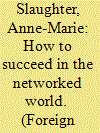

|
|
|
|
|
| Summary/Abstract |
Foreign policy experts have long been taught to see the world as a chessboard, analyzing the decisions of great powers and anticipating rival states’ reactions in a continual game of strategic advantage. Nineteenth-century British statesmen openly embraced this metaphor, calling their contest with Russia in Central Asia “the Great Game [2].” Today, the TV show Game of Thrones [3] offers a particularly gory and irresistible version of geopolitics as a continual competition among contending kingdoms.
|
|
|
|
|
|
|
|
|
|
|
|
|
|
|
|
| 11 |
ID:
169782


|
|
|
|
|
| Summary/Abstract |
This forum opens a debate that is long overdue: for far too long, the fields of international political sociology (IPS) and international political economy (IPE) have been standing apart. Discussions take place in different conference sections, in different networks that publish in different journals. Yet, this divide is surprising given that the two fields share similar trajectories, theoretical concerns, problématiques, and conceptual challenges. This forum starts exploring this shared terrain: we believe that there is no a priori reason to separate the sociocultural, the political and the economic when we aim at making sense of the world in any meaningful way. We propose that bridging the IPE-IPS divide has tremendous potential for the development of a socio-political economy analysis that, we believe, has two benefits. First, it allows for the opening of new empirical terrains or deepening and widening existing ones. Second, bringing IPE/S back together creates reflexive spaces for more holistic, embodied and contextualised conceptual innovation. The contributors to this forum show each in their own way such empirical and conceptual added value of moving beyond the IPE and IPS divide in order to develop what we call here a socio-political economy of the globe. They focus on various issues, such as the transformation of capitalism from an oil- to a data-dependent accumulation regime with the rising of the so-called ‘digital age’ (Chenou); the profound social, economic and political transformation triggered by urbanisation in the development world (Elias, Rethel and Tilley); emerging global risks and the neglected role of the insurance industry (Lobo-Guerrero); regional development-security nexuses (Lopez Lucia); and business power in climate change diplomacy (Moussu).
|
|
|
|
|
|
|
|
|
|
|
|
|
|
|
|
| 12 |
ID:
150410
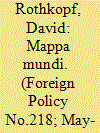

|
|
|
| 13 |
ID:
177730
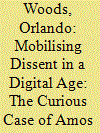

|
|
|
|
|
| Summary/Abstract |
Political containers frame opinions. They play a formative role in establishing the terms of interpretation, in distinguishing between assent and dissent, and in determining the extent to which dissent is publicly tolerated. Whilst it is by now widely acknowledged that the power and influence of political containers have been relativised by interconnection, the effects of moving within and between containers – and thus mediating between different framings of opinion – are under-theorised. Also, the enabling role of digital media in disseminating dissent, and in bringing about disproportionate reach and impact, remains understudied. Addressing these lacunae, this paper explores the ways in which dissent can be reproduced, reframed, and thus mobilised in a digital age. It advances the concept of geopolitical arbitrage to explain how movement can lead to the reframing of the political containers of origin and destination, and of the object that moved. By drawing on the case of Amos Yee – a young Singaporean blogger who was imprisoned for engaging in anti-religious “hate speech” – I demonstrate how digital media enabled the mobilisation of dissent by giving his voice undue attention, and how his movement from Singapore to the US on the grounds of asylum enabled a reframing of himself, and of the political containers that he moved between.
|
|
|
|
|
|
|
|
|
|
|
|
|
|
|
|
| 14 |
ID:
139340


|
|
|
|
|
| Summary/Abstract |
As advanced economies become more automated and digitized, almost all workers will be affected, but some more than others. Those who have what the economists Maarten Goos and Alan Manning call “lovely jobs” will do fine, creating and managing robots and various digital applications and adding lots of value in service sectors such as finance. Those who have what Goos and Manning call “lousy jobs,” however—in sectors such as manufacturing, retail, delivery, or routine office work—will fare less well, facing low pay, short contracts, precarious employment, and outright job loss. Economic inequality across society as a whole is likely to grow, along with demands for increased state expenditures on social services of various kinds—just as the resources to cover such expenditures are dropping because of lower tax contributions from a smaller work force.
|
|
|
|
|
|
|
|
|
|
|
|
|
|
|
|
| 15 |
ID:
113374
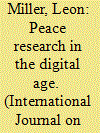

|
|
|
| 16 |
ID:
153821
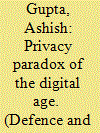

|
|
|
| 17 |
ID:
152957


|
|
|
|
|
| Publication |
London, I B Tauris,
|
| Description |
vii, 118p.pbk
|
| Standard Number |
9781784535926
|
|
|
|
|
|
|
|
|
|
|
|
Copies: C:1/I:0,R:0,Q:0
Circulation
| Accession# | Call# | Current Location | Status | Policy | Location |
| 059067 | 302.23/BRO 059067 | Main | On Shelf | General | |
|
|
|
|
| 18 |
ID:
150123
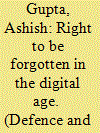

|
|
|
| 19 |
ID:
133231
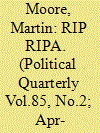

|
|
|
|
|
| Publication |
2014.
|
| Summary/Abstract |
This collection of pieces addresses questions raised by the Snowden revelations and their aftermath. All the authors were participants at a round-table discussion at King's College London on Thursday 20 March 2014. The round table was chaired jointly by Sir Lawrence Freedman and Lord [Peter] Hennessy. Those participating were: Baroness [Onora] O'Neill, Lord [Ken] Macdonald, Nigel Inkster, Professor Thomas Rid (King's College), Ewen MacAskill (The Guardian), Gordon Corera (BBC), Jemima Stratford QC, Peter Horrocks (BBC), Charlie Edwards (RUSI), Professor Jean Seaton (Westminster University), Bill Peace (King's, ex-SOCA), Air Vice-Marshal Andrew Vallance (DA-Notice), Carl Miller (DEMOS/King's), Lord (Alex) Carlile and Richard Sambrook (Cardiff University).
|
|
|
|
|
|
|
|
|
|
|
|
|
|
|
|
| 20 |
ID:
186059
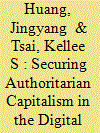

|
|
|
|
|
| Summary/Abstract |
To develop a robust surveillance apparatus in the digital age, autocracies are compelled to rely on foreign suppliers or to allow domestic private entrepreneurs to enter a strategic industrial sector. The process through which China developed a surveillance state led by globally competitive security companies exemplifies this authoritarian capitalist dynamic. Initial liberalization enabled domestic firms to adapt foreign technology and eventually introduce innovations in digital surveillance. By the late 2000s, China had developed a vibrant and segmented security industry: homegrown surveillance giants with the most advanced technology dominated public procurement contracts and export markets, while smaller and medium-size enterprises were creating intrusive monitoring applications that go well beyond what the state had originally envisioned. Because China’s surveillance state rests on strong public-private linkages, the assumed alliance between surveillance capitalists and a despotic state has generated external backlash from liberal democratic countries. Global supply chains involving sensitive technology have remained resilient, however.
|
|
|
|
|
|
|
|
|
|
|
|
|
|
|
|
|
|
|
|
|